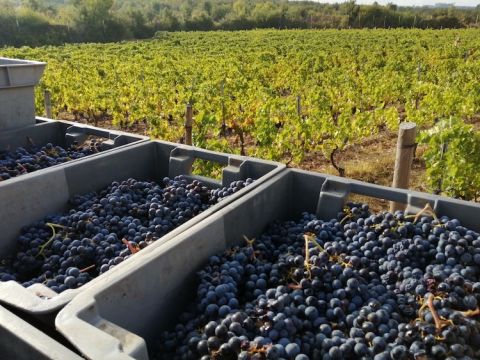From €29.95, £31, 379.90 Norwegian kroner, 1,390 Ukrainian hryvnia, HK$380, 429,999 Lebanese pounds
Before you take one look at the starting price of this wine and decide it’s too expensive, take a moment to look at the vintage. This is a superb, fully mature wine that’s already eight years old but is still in the prime of life.
Then take a look at where it was grown, in Syria. Consider how difficult it must be to get materials such as bottles and corks into Syria, and how immensely difficult it must be to get the wine out. All wines have the ability to express geography, but this one bears witness to a whole load of history and politics too.
It comes from the north-west of what’s left of the tragically war-torn country that is Syria today, near what was the ancient city of Antioch and in the hinterland of the port of Lattakia. Vines were grown here in ancient times and viticulture has been revived, against the odds, by the Saadé family, Levantine Christian traders who were originally landowners in this part of Syria but are now based in Beirut across the border in Lebanon – where they also produce Marsyas Lebanese wine. Since the outbreak of war they have not been able to visit the Syrian vineyard (where apparently it snows every winter; it’s at 900–1,000 m (2,950–3,280 ft) above sea level). So grape samples are sent to Beirut by taxi and winemaking is done by Zoom. Several members of the Saadé famly and team were injured in the terrible explosion in Beirut in 2020 (see Buy Lebanese!).
It's remarkable then that the wine is as good as it is. The Saadé family planted 12 hectares (30 acres) of vines in the first decade of this century (first vintage 2006), at 6,250 wire-trained vines per hectare. Yields average just 30 hl/ha (c 1.7 ton/acre) in this dry climate. They say they use no pesticides or herbicides, but I cannot see how they would achieve organic certification. Can you imagine persuading an inspector to come to Syria? (I have since been told that the vineyard is indeed certified organic!)
Soils are limestone, clay and flint, and cereal crops are planted between rows to improve aeration of the soil and to bolster organic matter. Syrah, Cabernet Sauvignon and Merlot grapes are treated to the usual classed-growth standards such as being picked into small crates and double sorted.
The growing season began with a usefully rainy winter then a mild spring and quite a hot summer but harvest didn’t begin until 8 September and extended into October for the Cabernet Sauvignon. The wine was aged for 14 months in French barriques of roughly equal portions of new, second-use and third use-barrels. I can’t really imagine how the heck they manage to ship into Syria from French coopers… The blend for 2014 is 60% Syrah with 20% each of Merlot and Cabernet but it is very much an integrated blend rather than showing any particular varietal character.
The wine is as intense as you would expect from an emissary from the arid land of the crusades, with the fragrance of balsam and savoury spices plus a top note of some dried herbs, but it manages to remain wonderfully fresh and appetising on the finish too after intense, ripe, quite complex fruit. Eastern promise indeed! I really don’t think many people would be disappointed by what this wine has to offer. It is 14.6% alcohol but is chock-full of flavour. I gave it 17 points out of 20 and suggest a drinking window of 2019 to 2029. This is serious wine to be enjoyed with food. It’s also relatively – surprisingly? – easy to find.
Alas, the one country where you won’t find this delicious and intriguing wine is the US. The FDA refused approval for a product from a country with which the US broke off diplomatic relations 10 years ago. So, I offer my apologies to you if you’re based in the United States. Should you travel outside the US, do try to taste this wine; it’s widely available in wine stores, on websites and on restaurant wine lists.
Wine-Searcher lists stockists in the UK, Ireland, France, Italy, Malta, Slovenia, Austria, Czechia, Netherlands, Germany, Belgium, Norway, Portugal, Ukraine(!), Hong Kong and of course Lebanon. According to marketing manager Ayman Khoury, Bargylus wine is in a total of 30 countries, including Japan, New Zealand and Canada. UK-based stockists include James Nicholson, Spirits24 and Highbury Vintners, as well as Swig who have just become Bargylus’ UK importer and will be offering it here at £36. Vinatis, who sell in many European countries, list this wine.
The wine should also be available next week at Imad’s Syrian Kitchen, Kingly Court, Carnaby Street, London, the restaurant opened by a Syrian refugee who had a few restaurants in Damascus, came to Britain as a refugee and, after a stint as a car salesman, has managed to get this restaurant up and running.
See all 10 of our tasting notes on Bargylus wines including four of this producer’s white wines.















